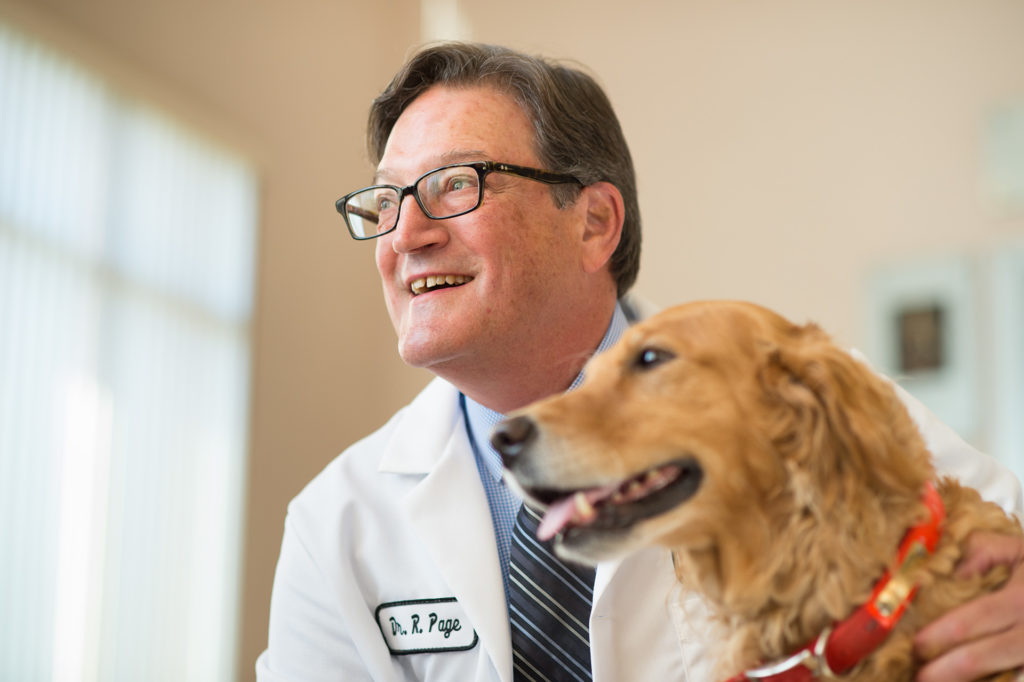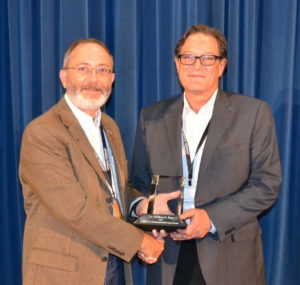
Dr. Rod Page, professor of medical oncology, Stephen J Withrow Presidential Chair in Oncology, and director of the Flint Animal Cancer Center at CSU’s James L. Voss Veterinary Teaching Hospital, received the American Veterinary Medical Association Career Achievement in Canine Research Award at the National Veterinary Scholars Symposium on July 27 in Worcester, Mass.
As a champion of comparative oncology, Page knows that buy-in at the highest levels is necessary to improve treatment options for all cancer patients.
In 2015, he led an initiative to convene the first-of-its-kind translational cancer workshop hosted by the Institute of Medicine’s National Cancer Policy Forum (now the National Academy of Medicine’s National Cancer Policy Forum). The event, held in Washington D.C., featured medical, veterinary, scientific, and policy leaders to explore the benefits and challenges of coordinating studies that aid multiple species. Ultimately, the conference provided an outline for next steps, served as a springboard for collaborations, and helped to release competitive funding from the National Cancer Institute.
To continue the momentum generated from the national conference, Page spearheaded the development of the Comparative Oncology Research Consortium, an academic/public/private partnership and the Jimmy V Foundation. The mission of the consortium is to enable accelerated, coordinated comparative oncology research, and fill in gaps in scientific knowledge in cancer medicine.
With a long list of professional achievements, one of his most noteworthy endeavors is with the Morris Animal Foundation. In 2010, Page was named the principal investigator and chair of the Scientific Steering Committee of the Golden Retriever Lifetime Study. This multi-million-dollar-lifetime cohort study is one of the largest, most comprehensive prospective canine health studies in the United States. The study’s purpose is to identify the nutritional, environmental, lifestyle, and genetic risk factors for cancer and other diseases in Golden Retrievers. Results will provide comprehensive data on diseases and other health challenges, including cancer, and serve as a launching point for future health studies in dogs.
“Dr. Page was one of the visionary scientists who worked with Morris Animal Foundation to develop and successfully launch our Golden Retriever Lifetime Study, which seeks to discover the risk factors for cancer and other diseases in dogs” said Tiffany Grunert, Morris Animal Foundation president and CEO. “This capstone project reflects Dr. Page’s career accomplishments that have helped to shape canine oncology as it exists today, and will shape cancer medicine in our pets and people well into the future.”
Four decades in comparative oncology

Page earned his D.V.M. from CSU in 1981. Prior to attending veterinary school, he received his master’s degree in medical physiology at Georgetown University School of Medicine. Following veterinary school, he completed specialty training in medical oncology at the Animal Medical Center and The Donaldson – Atwood Cancer Clinic. He is board-certified in medical oncology and internal medicine.
His interests in both animal and human medicine led him to the field of comparative oncology research, a focus of much of his nearly 40-year career.
Page joined the faculty of North Carolina State University’s College of Veterinary Medicine in 1984 where he built an impressive research resume and achieved full professorship. During that time, he also served as an adjunct assistant professor at the Duke University Medical Center in the Department of Radiation Oncology.
In 1999, Cornell University’s College of Veterinary Medicine recruited Page to its faculty. During his tenure, he founded the Sprecher Institute for Comparative Cancer Research and also served as Alexander de Lahunta Chair of Clinical Sciences.
After a successful decade at Cornell, Page returned to CSU in 2010 to lead the Flint Animal Cancer Center. Over the last nine years, he has established several research initiatives both at the cancer center and on the national stage. Notably, he has grown the cancer center’s One Cure Clinical Trials program, which seeks to find better diagnostics and treatments for companion animals and then translate those findings to people. Today the clinical trials team includes five full-time staff who manage more than 30 canine studies each year.
In 2010, Page also became a full member of the University of Colorado Comprehensive Cancer Center. Under his leadership, CSU and CU’s cancer center faculty have expanded collaborations to speed up advances in cancers that impact both pets and people.
Throughout his career, Page has worked to advance the field of oncology as the primary, senior, or co-author on over 125 peer-reviewed papers and 25 book chapters. His research is recognized internationally with ongoing invitations to present and guest lecture at events around the world.
About the American Veterinary Medical Association
The AVMA is a not-for-profit association representing more than 93,000 veterinarians working in private and corporate practice, government, industry, academia, and uniformed services. The AVMA acts as a collective voice for its membership and the veterinary profession. Each year, through their AVMA excellence awards, the organization recognizes individuals who have advanced the science and art of veterinary medicine, and who have shown exemplary concern for, and commitment to, the welfare and humane treatment of animals.